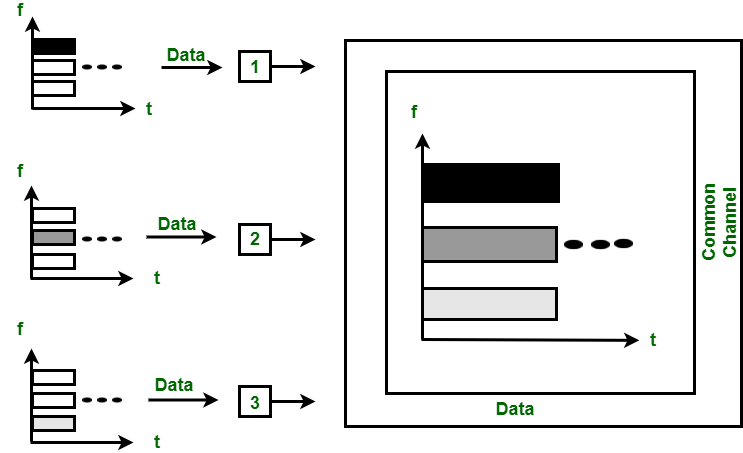1. 频分多址(FDMA):
FDMA 是一种信道化协议。在这个带宽中被划分为各种频段。每个站都分配有频段来发送数据,该频段始终为特定站保留,如下所示:

图 – FDMA
不同台站的频段之间被一小段未使用的频率带隔开,未使用的频段称为保护带,防止台站干扰。这就像数据链路层中的访问方法,其中每个站点的数据链路层告诉其物理层将传递给它的数据制成带通信号。信号是在分配的频段中创建的,物理层没有物理多路复用器。
2. 时分多址(TDMA):
TDMA 是信道化协议,其中信道带宽按时间划分到各个站点。每个站点都有一个时隙,站点只能在该时隙内传输数据,如下所示:

图 – TDMA
每个站必须知道其时隙的开始和时隙的位置。 TDMA 需要不同站之间的同步。它是数据链路层中的一种访问方法。在每个站数据链路层告诉站使用分配的时隙。
3.码分多址(CDMA):
在CDMA中,所有站点可以同时传输数据。它允许每个站点始终在整个频率上传输数据。多个同时传输由唯一的代码序列分隔。每个用户都分配有唯一的代码序列。

图 – TDMA
在上图中,有4个站点标记为1、2、3和4。数据分配给各个站点为d 1 、d 2 、d 3和d 4 ,分配给各个站点的代码为c 1 、c 2 , c 3和 c 4 。
FDMA、CDMA和TDMA的区别:
| FDMA | TDMA | CDMA |
|---|---|---|
| FDMA stands for Frequency Division Multiple Access. | TDMA stands for Time Division Multiple Access. | CDMA stands for Code Division Multiple Access. |
| In this, sharing of bandwidth among different stations takes place. | In this, only the sharing of time of satellite transponder takes place. | In this, there is sharing of both i.e. bandwidth and time among different stations takes place. |
| There is no need of any codeword. | There is no need of any codeword. | Codeword is necessary. |
| In this, there is only need of guard bands between the adjacent channels are necessary. | In this, guard time of the adjacent slots are necessary. | In this, both guard bands and guard time are necessary. |
| Synchronization is not required. | Synchronization is required. | Synchronization is not required. |
| The rate of data is low. | The rate of data is medium. | The rate of data is high. |
| Mode of data transfer is continuous signal. | Mode of data transfer is signal in burts. | Mode of data transfer is digital signal. |
| It is little flexible. | It is moderate flexible. | It is highly flexible. |